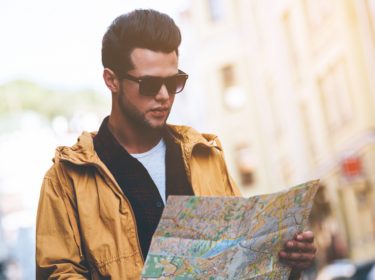Looking to travel by train on your next trip to an English-speaking country? We've got your back! Trains are a simple and great way to get around. Knowing key phrases that you can use while in a train station or train will ensure that you reach your destination.
Here we will introduce you to essential phrases that you can use when booking your train, standing at the platforms, and while riding a train. Take a look at the tables below and start improving your English!
Relax with Meditative Music
Relax with the Sounds of Nature: River
Relax with the Sounds of Nature: Wind
We at lingoneo want to provide you with learning material that truly supports your English learning. That's why we could use your help and feedback: Did you enjoy this exercise? Was it helpful? Were you able to relax? Do you have any suggestions for improvement, other feedback, or wishes? We look forward to hearing from you via our contact form.



Here we will introduce you to essential phrases that you can use when booking your train, standing at the platforms, and while riding a train. Take a look at the tables below and start improving your English!
Buying a Train Ticket: Traveler
Before you start your journey you'll need to get a ticket and find out when and where your train is leaving from. Below, you'll find phrases that you can use when booking your ticket.Buying a Train Ticket: Employee
Ticket offices are places in train stations where you can purchase tickets and ask any questions you may have. Below, we've gathered common questions that you may have to answer when booking a ticket, as well as examples of information you can get at a ticket office.What kind of ticket would you like?
When traveling by train, there are several types of tickets that you can buy. For example, there are one-way tickets and round-trip tickets. A one-way ticket will only take you to your destination. You can not use the same ticket to return to the place you traveled from. On the other hand, round-trip tickets can be used to travel to a new destination and to bring back to where you originally traveled from. Be careful when buying tickets. It's always a good idea to read through your options and to double check that you are buying the correct ticket type.
Do you have a rail pass?
A rail pass is a special card that you can buy, which reduces the price of tickets. Although you have to buy the pass itself, it will make all future tickets that you buy much cheaper. This means you could save a lot of money with a rail pass if you have to travel a lot by train. A rail pass is also sometimes called a rail card.
At the platform
Once you have your train tickets, you'll need to head to the correct platform to catch your train. The phrases below will be useful when you're heading there.First-class boards towards the front of the train
In English-speaking countries, trains are normally divided into two different classes. These are first class and second class. When buying a ticket, you will usually be asked which class you would like. First class tickets are more expensive than second class tickets, but riding in first class is usually more relaxing and luxurious. Make sure you pay attention to which class your ticket is for. For example, you are not allowed to sit in first class if your ticket is for second class.
On the train
After you've found the correct platform, all you have to do is wait for your train to arrive. The following phrases are useful once you've finally boarded and are on your way to your destination.Did you catch what they said over the speaker?
It can sometimes be quite noisy inside a train. Announcements about different things, like what the next stop is, are always made over a loudspeaker. If you don't understand what is said over the speaker, then ask a fellow passenger this question, and they may be able to help you.
Where is the buffet car?
If you get hungry or thirsty while in a train, it is oftentimes possible to buy food and drinks onboard the train. To do this, you usually have to go to a specific part of the train. This is called the buffet car. Sometimes train employees will also walk through the train and offer simple drinks and snacks that you can buy.
Relax while Listening to the Phrases
Keep calm and learn English! Listen to the phrases again with relaxing background music. This will help you improve your listening skills and remember the phrases. Choose your favorite style, then kick back and relax!
Relax with Meditative Music
Relax with the Sounds of Nature: River
Relax with the Sounds of Nature: Wind
Study Anytime & Anywhere with MP3s and PDFs
Take your learning on the go with our free mp3 and pdf downloads! Whether you're on your way to work or enjoying a coffee break, any time can be filled with a short review. Enjoy and happy learning!
Practice & Record a Dialogue
Take the next step and use what you’ve learned! Check out this topic’s dialogue unit and practice the phrases in a variety of exercises. Test your knowledge and get ready for real life conversations!
Good morning. How can I help you?en
Good morning, I would like to take the train to New York City.en
One-way or round trip?en








